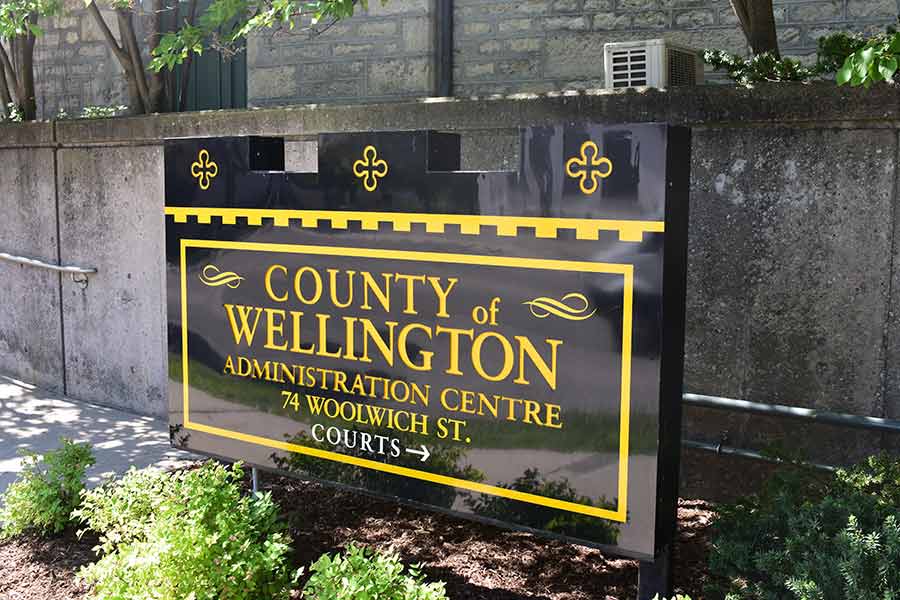WELLINGTON COUNTY – Local politicians and delegates will convene for a special meeting of the county’s social services committee on July 21, following motions passed by City of Guelph council on July 4.
Seven motions concerning homelessness, mental health and addictions were passed by Guelph councillors responding to concerns from business owners about how the behaviour of precariously housed and homeless persons congregating downtown negatively affects their businesses.
Three of those motions call on the county, as the province’s administrator of social services for the city and county, to take action with respect to such issues in Guelph.
The city is requesting the county:
- provide quarterly reporting on the provision of social services;
- identify gaps within the shelter system; and
- call an emergency meeting to hear from community social service providers.
County council and committees have adjourned for the summer, but social services committee chair David Anderson, responding to the request for an “emergency meeting,” called a special meeting to discuss the city’s concerns.
In advance of Thursday’s meeting at the county administration building in Guelph, social services administrator Eddie Alton provided a report intending to address the city’s requests, and provide clarity on what the county’s responsibilities are.
The county could agree to report on homelessness at future social services committee meetings, of which Guelph Mayor Cam Guthrie is a member, but Alton suggested the city approach appropriate “partners” for data when it comes to mental health and addictions, because the county doesn’t provide those services — clients needing such services would be referred by the county to other agencies.
Alton states county staff already “continually meet with community partners” such as the Guelph and Wellington Task Force for Poverty Elimination, Service Canada, United Way, East Wellington Community Services, Guelph Wellington Women in Crisis and Compass Community Services, among others.
“The county hosts and attends over seven different weekly, biweekly, and monthly meetings dealing with needs of individuals at risk or experiencing homelessness,” Alton notes in the report.
Regarding shelters, a city motion calls on the county to “report back” on gaps within the system “by August 2022 with a plan to achieve 24-hour coverage.”
But 24-hour coverage for 59 spaces in 48 rooms already exists within Guelph at a Holiday Inn located on Silvercreek Parkway and operated by Stepping Stone.
Alton also notes the Welcome In Drop-in Centre on Gordon Street in the downtown core provides 25 overnight spaces.
Both are currently funded by provincial-federal COVID-19 and Community Homelessness Prevention Initiative funding.
Pandemic funding is limited and when discontinued, would place the burden on “local taxpayers to support this model going forward,” Alton stated.
The county outlined three gaps and needs within the shelter system:
- mental health and addiction support within the system and community;
- supportive and transitional housing for 48 people (estimated $8.28 million); and
- a worker with varied skill sets focusing on Guelph’s downtown, who is able to provide outreach support with a housing focus.
Although the county is the province’s social services provider for the city when it comes to Ontario Works, housing services and child care, the county isn’t mandated by the province to handle provision of mental health and addictions services, and so it receives no funding for those services.
Other agencies do, such as the Canadian Mental Health Association.
To fund any programming or services addressing mental health and addictions, property taxes would need to be tapped and routed through what’s known as “discretionary spending” — meaning tax dollars used to fund a service not required by the province, but nonetheless provided by the city and county because a need was seen, as is the case with discretionary health benefits, offered mostly to low-income seniors.
Speaking by phone, Alton said Guelph’s call on the county is likely because of a misunderstanding about the county’s role and for what the county does and doesn’t receive funding.
“We want to work with [the city] and we’re very invested in these issues, but we may not have the funding, he said. “We’re more than willing to advocate on behalf of trying to get funding for this.”
Also speaking by phone, Guthrie talked of “an emergency” and an “urgent crisis situation” in Guelph surrounding homelessness and mental health and addictions.
Local businesses downtown are trying to survive after pandemic struggles, the mayor said, and are now subjected to people “experiencing really terrible mental health situations” and those struggling with addictions “in the public realm for all to see.”
The city found out about the special meeting on July 15, according to Guthrie, who said the county is taking issues seriously but may not understand the gravity of “what is actually happening on the ground.”
The mayor praised unprecedented action on the county’s part regarding social issues, but said “it is still not enough,” emphasizing a dire need for more supportive housing for those congregating downtown, where social services exist.
The mayor hopes the meeting serves to unify the city, county and social services agencies in identifying gaps and how to fill them, chiefly in the existing shelter system, where the mayor believes a “new lens and a new conversation” is required.
“We’re not going to be able to solve homelessness purely between two government agencies being the county and the city; we’re only going to be able to solve homelessness if we come together as a community …” Guthrie said.
“We cannot always wait around for the province to fill that gap, we need to come together to fill those gaps ourselves.”




